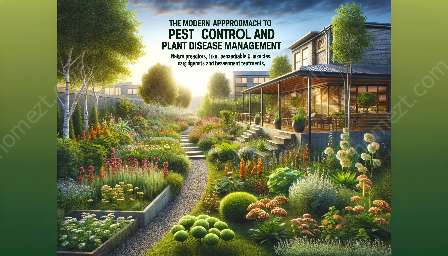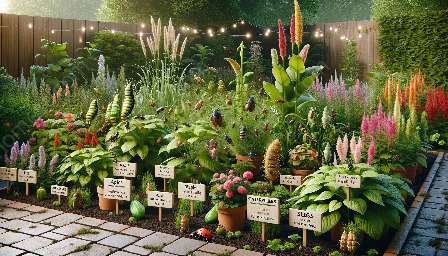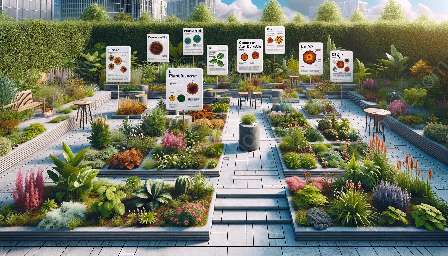Gardens are havens of life and growth, but they also attract unwanted pests and diseases that can threaten the well-being of plants. In this comprehensive guide, we explore the best organic pest control methods for gardens to help you maintain a healthy and thriving garden.
Understanding Organic Pest Control
Organic pest control refers to the use of natural, non-toxic methods to manage and eliminate pest infestations in gardens. Rather than relying on harmful chemicals, organic pest control focuses on creating a balanced ecosystem that promotes the presence of beneficial insects and organisms that naturally keep pest populations in check.
Companion Planting
Companion planting is the practice of growing certain plants together to enhance the growth of one or both plants, deter pests, or attract beneficial insects. This method can be used to naturally repel pests and minimize the risk of infestations.
Examples of companion plants:
- Marigolds: Planting marigolds around vegetables can repel nematodes, aphids, and other pests.
- Basil: Growing basil near tomatoes can help protect the tomato plants from pests such as whiteflies and mosquitoes.
- Lavender: The strong scent of lavender can deter mosquitoes, moths, and other garden pests.
Biological Pest Control
Biological pest control involves introducing natural predators or parasites to control pest populations. This method can be highly effective in managing pest infestations without the use of harmful chemicals.
Examples of biological pest control:
- Ladybugs: These colorful beetles are voracious predators of pests such as aphids, mealybugs, and mites.
- Praying mantises: Praying mantises feed on a wide range of insect pests, making them valuable allies in the garden.
- Nematodes: These microscopic organisms can target specific pests, such as grubs, caterpillars, and weevils, without harming beneficial insects.
Homemade Pest Sprays
Homemade pest sprays can be crafted using natural ingredients to repel or deter pests from infesting garden plants.
Example of homemade pest sprays:
- Neem oil spray: Neem oil is an effective natural insect repellent that can be diluted and sprayed on plants to combat a variety of pests, including aphids, mites, and whiteflies.
- Garlic and pepper spray: A mixture of crushed garlic and hot peppers steeped in water can be used as a natural insecticide to repel pests.
- Soap spray: A mild soap solution can be sprayed on plant leaves to suffocate and repel soft-bodied insects like aphids and mealybugs.
Soil Management
Healthy soil is the foundation of a thriving garden, and proper soil management practices can help prevent and control plant diseases and pest infestations.
Key aspects of soil management:
- Compost: Adding compost to the soil improves its structure and fertility, promoting healthy plant growth and natural resistance to pests and diseases.
- Rotating crops: Rotating crops helps prevent the buildup of soil-borne diseases and disrupts the life cycles of pests that target specific plant species.
- Mulching: Mulching with organic materials such as straw or wood chips helps conserve soil moisture, suppress weed growth, and create a habitat for beneficial soil organisms.
Attracting Beneficial Insects
Encouraging the presence of beneficial insects in the garden can help maintain a natural balance and reduce the risk of pest infestations.
Plants to attract beneficial insects:
- Yarrow: Yarrow attracts ladybugs, lacewings, and parasitic wasps that prey on garden pests.
- Dill: Dill attracts predatory insects and beneficial pollinators like hoverflies and bees.
- Fennel: Fennel is a magnet for beneficial insects such as lacewings and ladybugs.
Proactive Pest Monitoring
Regular monitoring of the garden for signs of pest infestations and plant diseases is crucial for early detection and effective intervention.
Indicators of pest infestations:
- Leaf damage: Holes, spots, or wilting leaves can be signs of pest feeding or disease presence.
- Presence of pests: Checking the undersides of leaves and stems for pests like aphids, caterpillars, or mites can help identify infestations early.
- Plant discoloration: Changes in leaf color or overall plant appearance may indicate stress caused by pests or diseases.
Integrated Pest Management (IPM)
Integrated Pest Management is an approach that combines various pest control methods to minimize economic, health, and environmental risks. It aims to prevent pest problems by managing the ecosystem and utilizing the most sustainable and effective strategies.
Components of IPM:
- Cultural practices: Including sanitation, crop rotation, and mulching to reduce pest pressure.
- Mechanical control: Utilizing physical barriers, traps, and handpicking to control pests.
- Biological control: Introducing natural enemies and predators to manage pest populations.
- Chemical control: Limited and precise use of low-toxicity pesticides as a last resort.
Conclusion
Creating and maintaining a healthy garden is an ongoing journey that requires dedication and thoughtful management. By implementing organic pest control methods, you can protect your garden plants from pests and diseases while preserving the natural balance of the ecosystem. By understanding and utilizing natural solutions, you can cultivate a thriving garden that sustains both plant life and beneficial organisms.



















